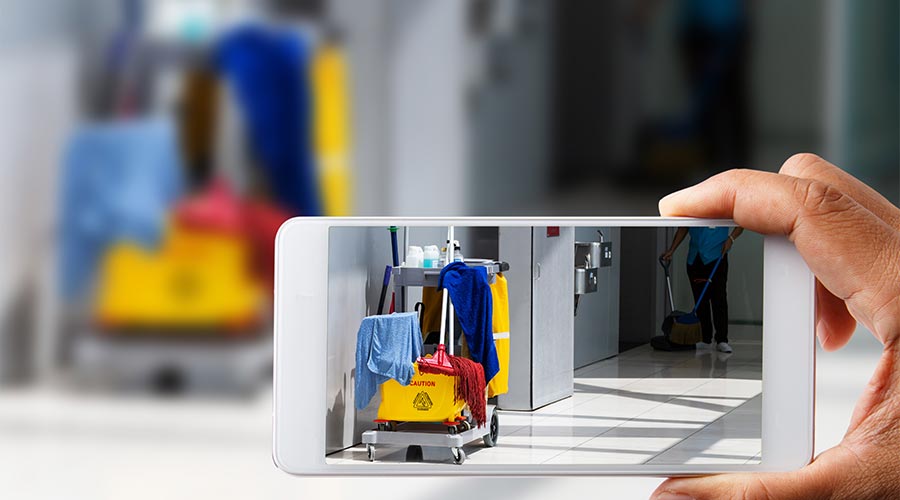
The primary focus of commercial cleaning companies is to create and maintain healthy and safe environments for building occupants, employees, and customers, enhancing the overall appearance and reputation of the facilities they clean and maintain. While contributing to the overall health and success of the businesses that employ them, cleaning companies themselves must do more than simply show up with a vacuum, cloths, and cleaning chemicals to get the job done.
Managing a cleaning company is challenging. Successful managers spend time selecting, maintaining, and as needed, replacing the best equipment to ensure the success of their staff in the field. They also need to interview, hire, train, schedule, and direct their staff; manage payroll and expenses; track work orders and job completion; communicate routinely with customers; create proposals to bid on new business; and more.
Fortunately, there are tools available to building service contractors that can help tackle all the above, and more. There are a number of software programs and platforms available to facilitate the business side for building service contractors. But juggling multiple software options can be time consuming and resource intensive. If the various software programs don't work together, managing the different platforms can suck up even more labor hours. This also requires a certain amount of learning and training on multiple programs.
The better option is to find a comprehensive software solution that is not only a fit for each company/client, but one that can effectively handle these diverse functions without compromising on ease-of-use or integration.
The challenge is, new software can be expensive, daunting, and difficult to maintain. Many business owners might not know how to start looking at software options to streamline their company.
Maybe they have a handful of employees and are managing with text messaging, an email account, a simple website, and some bare-bones accounting software. Maybe they are a large company with several locations across North America, a solid roster of sizable commercial clients, and hundreds of employees, but they are still relying on a handful of software platforms that aren't integrated into a single entity.
Experts recommend cleaning contractors outline exactly what methods are currently being used for staff communication, payroll, workloading, client management, etc. Once that is flushed out, take a moment to identify goals and objectives that managers would like to achieve with new processes. From there, search for software solutions that tackle as many of the goals as possible.
Operating to Scale
Susana Urrutia, founder and CEO of Solutions Cleaning LLC in Cleveland, currently has 12 employees. She hasn't yet invested in a software platform to manage her company.
“I found generic templates and free platforms through Google,” she explains. “I do this because my business is small and I need to watch expenses.”
She doesn't have staff dedicated to office functions; all her employees work as cleaners. The free templates she uses are for estimating and invoicing, which she modifies to fit her needs. For now, Urrutia considers her website and social media apps such as Facebook, Instagram, Next Door, and Angie's List, to be the software tools she uses to expose and grow her business.
On the other end of the spectrum, Tim Conn, president of co-founder of Image One Facility Solutions, Chicago, oversees 25 franchises throughout the country. In the past, his company used software options marketed to the cleaning industry and experienced great success.
“There are a lot of them out there that are good,” he says. But over time and as his company expanded, he realized that “some of them have been overdeveloped, and they've gotten confusing. Others don't do everything you want, so you need to have two or three or four different programs to do everything. We chose to eliminate using five different programs and create exactly what we want.”
Unable to find exactly what they needed in a software solution, Conn's company developed their own proprietary system from the ground up.
“As a franchise operation, it was important for us because it's all about branding and having that brand front and center,” he explains.
The first step was developing a survey for iPad that allowed them to go out in the field and create proposals. Then an inspection app was developed for doing inspections on a regular basis: weekly, monthly, whatever timeframe is requested by the client. Next was a desktop component that incorporated training for franchise owners, training for their employees, and sales training.
“Our system does all their accounting, as well as the full bid process. It's also a platform for communication with clients,” he says. “It encompasses everything we need.”
But the system, which exists solely on the Apple platform, isn't finished. There are always improvements or new capabilities that are needed.
“It never ends,” Conn admits. “That's the good and the bad about having your own software. You always know there are more things that you want to do, and it ends up costing money. But we're constantly improving it.”
He said they're currently implementing time clock software, which will eliminate the need to have a separate system for that function.
“Payroll will be incorporated into one location, which will be more convenient for the franchise owner,” he says. “That's being done because that's what they asked for. We're happy to incorporate a function that will make their franchise run better and then be able to give better service to clients.”
The Right Software Makes All the Difference

 The Down and Dirty on Cleaning in Virus Season
The Down and Dirty on Cleaning in Virus Season How Surfactant Use is Expanding in Commercial Cleaning
How Surfactant Use is Expanding in Commercial Cleaning Maximize Your Margins: Learn How to Automate Pricing and Track Rebates
Maximize Your Margins: Learn How to Automate Pricing and Track Rebates